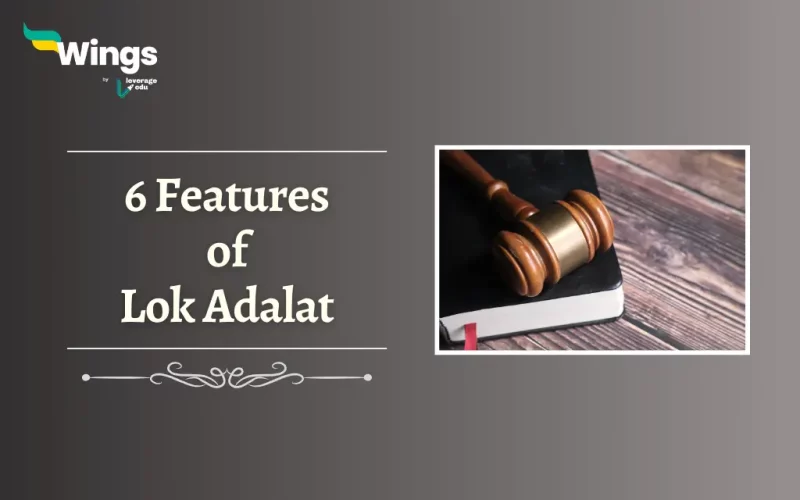The very first Lok Adalat camp in Gujarat started in 1982 after India gained independence. Moreover, it was successful in solving disputes. Thereafter, Lok Adalats spread to different parts of India. At first, these places were voluntary and aimed to solve problems without using laws. Furthermore, as Lok Adalats became more popular, people wanted them to have legal support and recognition for their decisions. Thus, in the year 1987, the Legal Services Authorities Act gave Lok Adalats a legal status. Read on to learn about the 6 Features of Lok Adalat in India.
1. Empowerment to Organize Lok Adalats
The State Legal Services Authority, District Legal Services Authority, Supreme Court Legal Services Committee, High Court Legal Services Committee, or the Thluk Legal Services Committee have been given the power to arrange Lok Adalats at intervals and locations of their choosing. Thus, exercising their jurisdiction over areas deemed appropriate by them.
Also Read: 3 Types of Lok Adalat in India
2. Lok Adalat Composition
Moreover, each Lok Adalat established for a specific region will be composed of a specified number of serving or retired judicial officers and people from the area, as decided by the organizing agency. Normally, a Lok Adalat includes a judicial officer serving as the chairperson along with a lawyer and a social worker as members.
Also Read: 7 Functions of High Court in India: Jurisdiction and Power
3. Jurisdiction
A Lok Adalat, under its jurisdiction, can determine and reach a compromise or settlement between the parties involved in a dispute regarding:
- any case pending before any court; or
- any matter falling within the jurisdiction of a court but not yet brought before such court.
Therefore, this means that the Lok Adalat is empowered to address not just cases already in court but also disputes at the pre-litigation stage.
However, the Lok Adalat does not have jurisdiction over any case or matter relating to an offence that is non-compoundable under any law. In simpler terms, offences classified as non-compoundable under any law are beyond the scope of the Lok Adalat.
Also Read: 3 Exceptions to Fundamental Rights in India
4. Referral to Lok Adalat for Case Settlement
This feature of Lok Adalat states that a case pending before the court could be referred to the Lok Adalat for settlement under the following circumstances:
- If the parties involved agree to settle the dispute in the Lok Adalat.
- If one of the parties makes an application to the court to refer the case to the Lok Adalat.
- If the court determines that the matter is appropriate to be taken up by the Lok Adalat.
In the instance of a pre-litigation dispute, the matter can be referred to the Lok Adalat for settlement. This is done by the agency organizing the Lok Adalat upon receiving an application from any of the parties involved in the dispute.
Also Read: Devolution of Powers and Finances up to Local Levels
5. Legal Powers
The Lok Adalat shall possess the same powers as those vested in a Civil Court under the Code of Civil Procedure (1908) when dealing with a suit concerning the following matters:
- summoning and enforcing the attendance of any witness, examining them on oath;
- discovering and producing any document;
- receiving evidence on affidavits;
- requisitioning any public record or document from any court or office; and
- such other matters as may be prescribed.
Additionally, a Lok Adalat shall have the necessary powers to specify its procedure for the determination of any dispute brought before it. Moreover, all proceedings before a Lok Adalat shall be considered judicial proceedings under the Indian Penal Code (1860), and every Lok Adalat shall be deemed to be a Civil Court for the Code of Criminal Procedure (1973).
Also Read: What is the Difference between Lok Adalat and Permanent Lok Adalat in India?
6. Lok Adalat Awards
In this feature of Lok Adalat an award from a Lok Adalat will be considered a decree from a Civil Court or an order from any other court.
- Each award issued by a Lok Adalat will be conclusive and binding on all the parties involved in the dispute.
- Moreover, there shall be no appeal to any Court against the decision of the Lok Adalat.
Related Blogs
Lastly, we hope you liked our blog and gained an understanding of the 6 Features of Lok Adalat. Moreover, you may even read more blogs and empower yourself with knowledge regarding Civics and Polity!
 One app for all your study abroad needs
One app for all your study abroad needs













